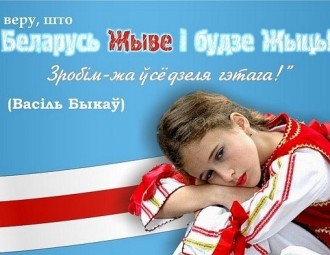Tatsiana Vadalazhskaja: Belarusan thinking is poetic if we consider the quotes that people send us

Most often Belarusans recall works by Bykau and Karatkevich. However, they quote fresh thoughts: both from the books of Sieviarynec and Babkou as well as pearls found in the 16th century.
The project “Cytuj svajo!” (Belarusian “Quote your own!” – EuroBelarus) continues at the Internet space of “EuroBelarus”, “Budz’ma”, Flying University, and Belarusian Collegium. The project calls upon Belarusans to recall the best quotes of famous literary men, thinkers, civic and political actors of our country.
Everyone willing to take part in the project can send their favorite quotes of Belarusan authors to [email protected]. And then, probably, the chosen quote will decorate the project and become a subject of discussion.
Not only common Internet users have joined this collaboration, but also the authors of the quotes, too – our notable contemporaries. Everyday they comment upon the published pearls of thinking – agree or argue with them, and, of course, reason their own choice. For example, writer Victar Martsinovich liked three quotes of Mihas Straltsou, Yakub Kolas, and Ihar Babkou at once; culturologist Julia Charniauskaja also chose the quote of the latter.
Obviously, the project lives and steps forward, but at what pace? And, which is most important, who from the famous Belarusians influences the thoughts of compatriots, and who is quoted most often? We talked about it with one of the authors of the project - Tatsiana Vadalazhskaja, coordinator of the Flying University, candidate of sociological sciences.
- Tatsiana, how successful is the realization of the project?
- Campaign “Quote your own!” was meant to draw the attention of Belarusans to the deep and accurate thoughts voiced by our ancestors and that are voiced by our contemporaries now; it was meant to show that we have this significant part of culture in our continuous tradition.
Of course, our efforts do not make Belarusans rush to recall, read, and discuss “Belarusian thinking”, but it seems that gradually this layer of Belarusan culture and identity is becoming closer.
I think that it is hardly possible that someone will seriously argue with the thesis about pearls and wisdom in Belarusan thinking. But few people can immediately recollect something accurate; memory only gives “clever thoughts” of not Belarusan origin.
Each day we suggest a new quote, there are more than 17 of them now, so everyone can find something that is very close and important to them.
- Are there already a lot of quotes at the e-mail of the “Quote your own!” coordinators?
- About 30 people sent their quotes. Usually these are not mere phrases, but lines or the whole selection.
- Who of the Belarusan thinkers, literary men, civil and political actors are quoted most often? Who found themselves among the leaders of the “rate”?
- If we consider the quotes that we receive, Belarusan thinking is poetic. Most often we receive verses of Yakub Kolas, Maksim Tank, Maksim Bahdanovich, Anatoly Sys, Leanid Dran’ko-Majsuk, Andrei Mel’nikau, Ales Razanau, Georg Lihtarovich, and Yauhen Guchka. Most often Belarusans recall works by Vasil Bykau and Uladzimir Karatkevich.
I was glad to see thoughts that were born recently – quotes from the book by Aliaksei Shyn “Sem’ kamianiou” (Belarusian “Seven stones” – EuroBelarus), by Paval Sieviarynec “Belaruskaja glybinia” (Belarusian “Belarusian depth” – EuroBelarus), by Ihar Babkou “Hvilinka” (Belarusian “A minute” – EuroBelarus), as well as thoughts that jump in the depth of centuries – Andrei Valian, Sigismund Lauksmin, Mihalon Litvin.
- What do you think, are there enough Internet-areas for the project?
- Of course, it’s not enough for this project to become fashionable. But we would like this initiative to be picked up by other information resources that have broad audience.
- Why is the project original and what goals do you want to achieve?
- I know that it is not the first attempt to advert to Belarusan thoughts. It was done by “Radio Liberty”, by dumki.org website that collects quotes. Our task is to raise this topic one more time all the more that we see the raise in interest towards everything Belarusian and towards Belarusian culture. And thinking is an indispensable part of culture; even though it might be the most hidden and shrouded for an average Belarusian. It is very important that thinking becomes a part of our identity and a part of our tradition.
-
03.01
-
07.10
-
22.09
-
17.08
-
12.08
-
30.09



























